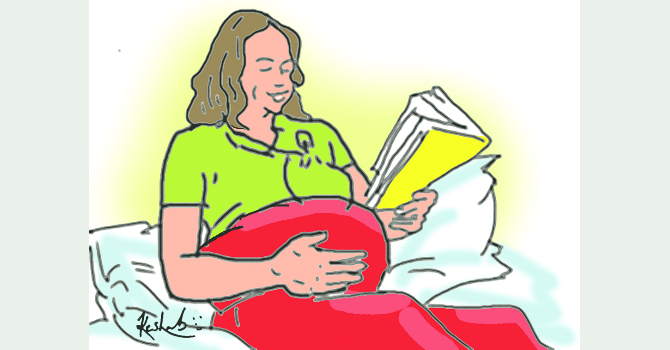Pregnant women’s ordeal in the time of coronavirus, lockdown

By Renuka Dhakal
Kathmandu, May 24: As the entire world is under the grip of COVID -19 pandemic, Pramila Baskota, 34, is in 21 weeks of her pregnancy and she looks forward to welcome her second child.
But she is quite anxious and frustrated as she couldn’t go for her regular check-up and even for anatomy/anomaly scan due to the fear of COVID-19 infection and the lockdown. She has been in deeper fear after the death of a post-partum mother due to COVID-19 last week.
Nine years after her first child, she is expecting her second child. She dreams of doing everything in her pregnancy that she was unable to fulfill during her first pregnancy.
Unfortunately, in the meantime, the coronavirus has spread around the world, with people compelled to live in isolation. She said, “I am stressed because of the fear of the virus contagion; I am unable to buy necessary fruits, vegetables and nuts which has made me restless.”
Similarly, 31-year-old Manjari Dahal, who is 20 weeks pregnant, is worried that she is not be able to eat fruits and vegetables properly as shops are closed. Besides, she fears that she may be infected with the virus if she buys and eats them.
Moreover, she easily gets stressed out from the news, because due to lockdown, everyone is forced to stay indoors and mobile and TV have become the best pastime for everyone.
According to Prof Dr Achala Vaidya, Chief Consultant Gynecologist at Norvic International Hospital, she has been receiving complaints from pregnant women like stress, anxiety, lack of sleep and shortness of breath.
Most people have a misconception that pregnant women are more vulnerable and the virus easily attacks them. However, Dr Vaidya clarified that there was no difference between pregnant and other normal healthy people of infection but pregnant women with existing diabetes, asthma, lungs problem, cough and flu allergy should be more careful than normal pregnant women.
Royal College of Obstetricians & Gynecologists also said that pregnant women were not at greater risk of severe illness than the non-pregnant population.
In addition, immunity is the key to fight against any virus and to boost immunity one should drink water adding a pinch of turmeric, lemon and black pepper twice a day after food at home during the lockdown, which helps to boost the immune system, said Vaidya.
Furthermore, she said that yoga and meditation are good for the pregnant women for maintaining mental balance during the gestation, said Vaidya.
In the midst of lockdown, pregnant women have been unable to visit hospitals regularly. At such times, they should regularly notice fetus movements, keep weighing machine at home and frequently measure the weight and take note
of excessive loss or gain of weight. Excessive weight may cause diabetes and weight loss may affect the babies’ weight, said Vaidya.
It is important to look after mental health and wellbeing during the gestation. Dr Vaidya suggested reading religious, spiritual books, doing painting, listening to music, and doing some cooking and things that make one happy and interact with family members which helps understand each other's feelings.
Likewise, Bimala Malla, Senior Gynecologist, Valley Maternity Nursing Home, said that pregnant women were facing psychological trauma as they couldn’t come for regular check-ups as in normal times though the doctors had been providing consultations to their patients via phone and guiding for general necessity.
She said that they were doing 90 per cent counseling from home, adding if many patients visited maternity home or hospital doctors would also face problem as staff members and technicians were not coming to hospitals due to lockdown. So fewer staff and technicians cannot handle the flow of patients.
Doctors have been facing the challenge to provide anomaly/anatomy scanning facility which is done from 18 to 22 weeks of gestation to check physical development and whether the baby is normal or has any kind of abnormality, said Malla.
Malla further said that pregnant women should mentally relax. If they relax mentally, the fetus gets enough oxygen which helps in proper development of the fetus and they should take calcium and iron as per doctor’s prescription. If pregnant women get mental stress, they lack appetite which hampers the fetus’ development, said Malla.
Malla has been receiving problems also from new parents like lack of availability of BCG vaccine for newborns which is given to the infant to protect from serious forms of tuberculosis usually from birth to 10 weeks.
At such an unprecedented time even a newborn cannot receive love from the loved ones due to social distancing protocol, and new parents face the challenge of buying necessary items for their babies too.
Vaidhya and Malla both said that the government should provide ambulance facility to the pregnant and the government also could provide counseling and awareness programmes from various media which would significantly help the pregnant in the midst of extended lockdown.
Recent News

Do not make expressions casting dout on election: EC
14 Apr, 2022
CM Bhatta says may New Year 2079 BS inspire positive thinking
14 Apr, 2022
Three new cases, 44 recoveries in 24 hours
14 Apr, 2022
689 climbers of 84 teams so far acquire permits for climbing various peaks this spring season
14 Apr, 2022
How the rising cost of living crisis is impacting Nepal
14 Apr, 2022
US military confirms an interstellar meteor collided with Earth
14 Apr, 2022
Valneva Covid vaccine approved for use in UK
14 Apr, 2022
Chair Prachanda highlights need of unity among Maoist, Communist forces
14 Apr, 2022
Ranbir Kapoor and Alia Bhatt: Bollywood toasts star couple on wedding
14 Apr, 2022
President Bhandari confers decorations (Photo Feature)
14 Apr, 2022











